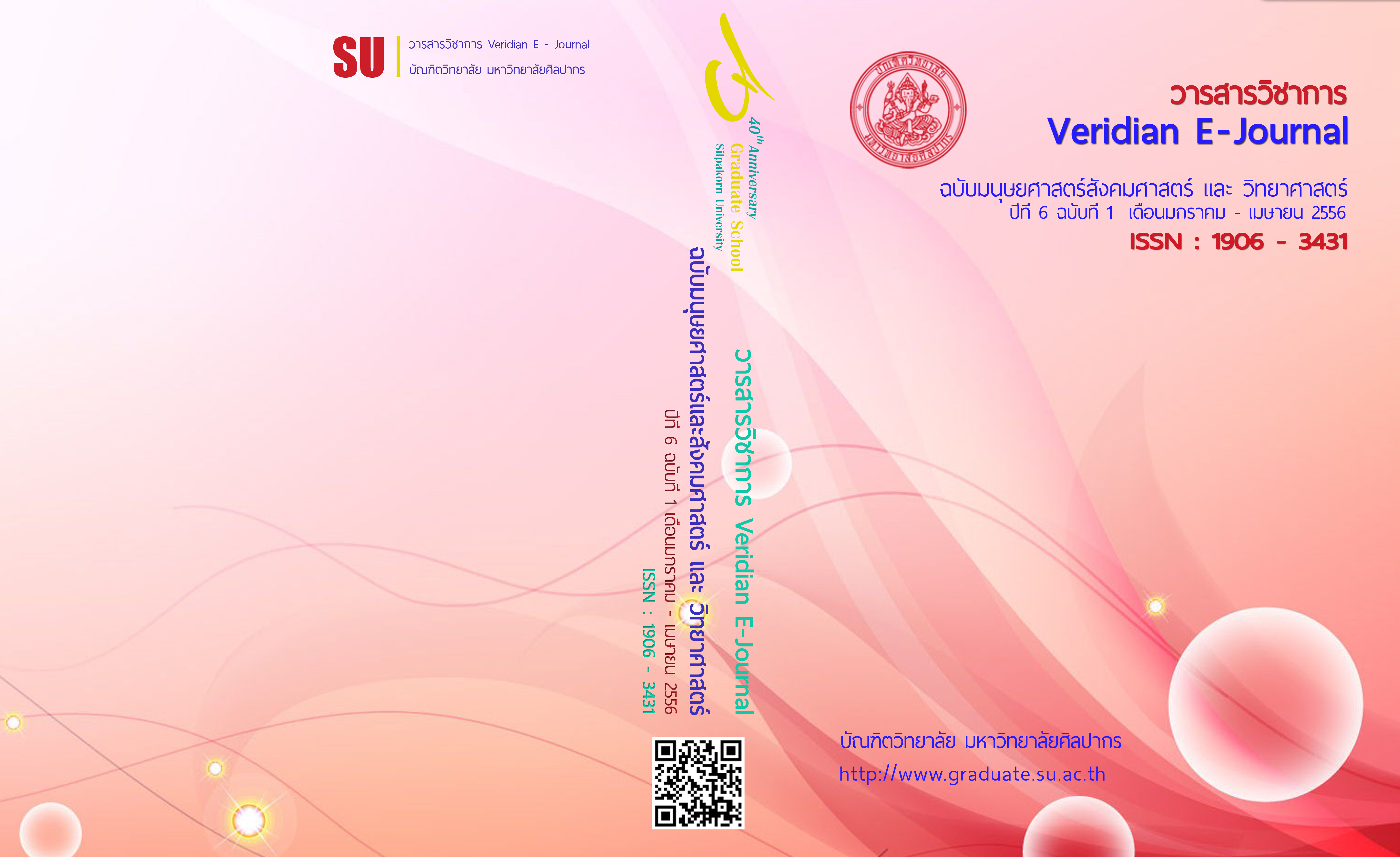การพัฒนาหลักสูตรฝึกอบรมค่ายภาษาอังกฤษเพื่อเสริมสร้างทักษะการพูดภาษาอังกฤษ ความรู้ด้านกิจกรรมค่ายภาษาอังกฤษ และทักษะสังคม สำหรับนักศึกษาสาขาวิชาภาษาอังกฤษ คณะศึกษาศาสตร์ มหาวิทยาลัยศิลปากร
Main Article Content
บทคัดย่อ
บทคัดย่อ
การวิจัยครั้งนี้ มีวัตถุประสงค์เพื่อ 1) เพื่อศึกษาข้อมูลพื้นฐานในการพัฒนาหลักสูตรฝึกอบรมค่ายภาษาอังกฤษ 2) เพื่อพัฒนาและหาประสิทธิภาพของหลักสูตรฝึกอบรมค่ายภาษาอังกฤษให้มีประสิทธิภาพตามเกณฑ์ 75/75 3) เพื่อประเมินประสิทธิผลของหลักสูตรฝึกอบรมค่ายภาษาอังกฤษโดยศึกษาประเด็นต่าง ๆ ดังนี้ 3.1) เปรียบเทียบทักษะการพูดภาษาอังกฤษของนักศึกษาก่อนและหลังการฝึกอบรมและศึกษาขนาดของผล (Effect Size) 3.2) เปรียบเทียบความรู้ด้านกิจกรรมค่ายภาษาอังกฤษของนักศึกษาก่อนและหลังการฝึกอบรมและศึกษาขนาดของผล 3.3) เปรียบเทียบทักษะสังคมของนักศึกษาก่อนและหลังฝึกอบรมและศึกษาขนาดของผล และ 3.4) ศึกษาระดับความพึงพอใจของนักศึกษาที่มีต่อหลักสูตรฝึกอบรม กลุ่มตัวอย่างเป็นนักศึกษาชั้นปีที่ 4 สาขาวิชาภาษาอังกฤษ คณะศึกษาศาสตร์ มหาวิทยาลัยศิลปากร ปีการศึกษา 2555 จำนวน 38 คน โดยวิธีการเลือกแบบเจาะจง ใช้เวลาในการทดลอง 3 วัน รวม 20 ชั่วโมง ผลการวิจัยพบว่า 1) ข้อมูลพื้นฐานในการพัฒนาหลักสูตร ได้แก่ หน้าที่ภาษาที่จำเป็นสำหรับครูสอนภาษาอังกฤษระดับมัธยมศึกษาตอนต้น ด้านกิจกรรมสำหรับค่ายภาษาอังกฤษ ทักษะสังคมที่จำเป็นสำหรับครูสอนภาษาอังกฤษ และ เนื้อหาสาระที่เกี่ยวกับประชาคมอาเซียนและประเทศสมาชิก ตลอดจนพบว่ากลุ่มตัวอย่างประเมินความสามารถในการพูดภาษาอังกฤษ และความรู้ความเข้าใจด้านกิจกรรมค่ายภาษาอังกฤษโดยเฉลี่ยอยู่ในระดับปานกลางเท่านั้น 2) หลักสูตรค่ายภาษาอังกฤษที่ผู้วิจัยสร้างขึ้นมีประสิทธิภาพ (E1/E2) เท่ากับ 81.12/80.90 ซึ่งสูงกว่าเกณฑ์ 75/75 ที่กำหนดไว้ 3) หลักสูตรฝึกอบรมค่ายภาษาอังกฤษที่ผู้วิจัยสร้างขึ้นมีประสิทธิภาพ ดังนี้ 3.1) ทักษะการพูดภาษาอังกฤษของนักศึกษาหลังอบรมสูงกว่าก่อนอบรมอย่างมีนัยสำคัญทางสถิติที่ระดับ .05 และ มีผลขนาดใหญ่มาก 3.2) ความรู้ด้านกิจกรรมค่ายภาษาอังกฤษของนักศึกษาหลังอบรมสูงกว่าก่อนอบรมอย่างมีนัยสำคัญทางสถิติที่ระดับ .05 และมีผลขนาดใหญ่มาก 3.3) ทักษะสังคมของนักศึกษาหลังอบรมสูงกว่าก่อนอบรมอย่างมีนัยสำคัญทางสถิติที่ระดับ .05 และมีผลขนาดใหญ่ 3.4) นักศึกษากลุ่มตัวอย่างมีความพึงพอใจต่อหลักสูตรฝึกอบรมโดยภาพรวมในระดับมากที่สุด
Abstract
The objectives of the research were 1) to investigate fundamental data for elementary English teachers using needs analysis 2) to develop a training program on the 75/75 efficiency criterion 3) to investigate effectiveness of the training as follows: 3.1) to compare English speaking abilities of the students before and after training 3.2) to compare English camp activity knowledge of the students before and after training 3.3) to compare students’ social skills before and after training 3.4) to survey students’ satisfaction with the training program. The sample for this research was purposively selected to be thirty eight of the fourth year undergraduate students, English major, Faculty of Education, Silpakorn University, class of 2012. It was conducted in 3 days and was for 20 hours in total. The results of the study were as follows: 1) The fundamental data to develop the training program such as language functions for EFL teachers, English camp activities, social skills necessary for English teachers and basic information about ASEAN and its members were identified. Also the needs assessment survey using questionnaires showed that the average scores of the self-assessment in English speaking skills and knowledge of organizing English camp were at medium level. 2) The developed training program in the field tryout stage reached the efficiency (E1/E2) at 81.12/80.90 which was higher than the established requirement of 75/75. 3) After implementation of the English Camp Training Program, the learning evaluation revealed the following: 3.1) The average scores of English speaking skills in post-test were significantly higher than pre-test scores at .05 level and its effect size was very large. 3.2) The average scores of knowledge of English camp activity in post-test were significantly higher than pre-test scores at .05 level and its effect size was very large. 3.3) The average scores of social skills self-awareness in post-test were significantly higher than pre-test scores at .05 level and its effect size was large. 3.4) The satisfaction survey indicated that students’ overall satisfaction with the training program was at the highest level.

